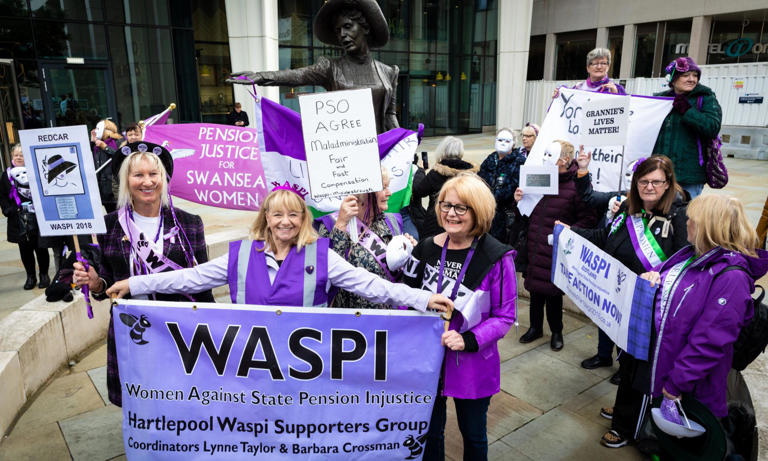WASPI Women Pension Inequality highlights the struggles faced by women affected by changes to the state pension age, leaving many like Jacqueline Wilcock feeling abandoned and undervalued.

WASPI Women Pension Inequality: A Case of Broken Promises and Financial Hardship
WASPI Women Pension Inequality has been a significant issue in recent years, affecting millions of women across the UK. These women, often referred to as WASPI (Women Against State Pension Inequality), have faced unexpected and unfair changes to their state pension age, leaving them in financial distress during what should have been their retirement years. One such woman is Jacqueline Wilcock, a 66-year-old grandmother from Derby, whose story reflects the struggles faced by many WASPI women.
The Impact of Changing the Pension Age
Jacqueline Wilcock worked nearly three decades as a community nurse for the NHS. As a single mother of four, she often worked grueling 20-hour days to make ends meet. Overworked and exhausted, Jacqueline was counting down the years until she could retire at 60, believing she would finally be able to rest and enjoy her well-earned pension. However, just four years before she reached her anticipated retirement age, Jacqueline received a devastating letter informing her that the state pension age had been increased to 66. This unexpected change meant that she had to work an additional six years before she could retire, a situation that plunged her into despair.
Struggling to Keep Up
The WASPI Women Pension Inequality issue didn’t end there for Jacqueline. Already struggling to cope with the increased pension age, she was recently dealt another blow when the government changed the rules for the winter fuel allowance. Jacqueline, who had been looking forward to receiving this allowance for the first time, found out that she would miss out on it once again due to the new eligibility criteria. “It feels like they move the goalposts all the time, and it makes you feel like you’re not worth anything after everything you’ve done,” Jacqueline shared. This constant shifting of support mechanisms has left her feeling abandoned by a government she believes no longer cares about people like her.
The Reality of Life Without a Pension
At 56, Jacqueline was still working long hours in the NHS, finding the workload increasingly difficult to manage. After learning about the change in her pension age, she made the tough decision to cash in her NHS pension early at 58, reducing her work hours to cope with the physical and emotional toll of her job. Despite cutting down to 20 hours a week, and eventually to 12 hours a week, Jacqueline found herself relying heavily on her pension lump sum to cover basic necessities such as her mortgage, bills, and food.
When her lump sum and savings ran out, Jacqueline had no choice but to turn to credit cards to get by. This reliance on debt only added to her financial stress, which has persisted even after she finally reached her state pension age of 66. Her story is a stark reminder of the challenges that come with WASPI Women Pension Inequality.
The Burden of an Unpaid Mortgage
Jacqueline’s financial struggles are compounded by her ongoing mortgage payments. She has an interest-only mortgage on her home, which means she will never fully own her property. Recently, her fixed mortgage rate ended, resulting in an increase of £200 per month in her payments. With a state pension of £957 per month and a mortgage payment of £520, more than half of Jacqueline’s pension goes towards her mortgage, leaving her with very little to live on.
“I feel quite envious of people who say they are mortgage-free because I know I will never be,” Jacqueline lamented. After years of hard work and sacrifice, she is now faced with the reality that she will always have a mortgage, and the financial burden that comes with it.
Disappointment in Government Promises
Jacqueline, like many others affected by WASPI Women Pension Inequality, is deeply disappointed in the government’s handling of the situation. Having voted for Labour, she now regrets her choice, feeling betrayed by broken promises and policies that have made her life more difficult. “I can’t believe how they have gone against so many things they said before the election and broken their promises,” she said.
The ongoing financial challenges, coupled with the government’s lack of support, have left Jacqueline dreading the upcoming winter. With the cost of living rising and her budget stretched to the limit, she is already doing everything she can to cut back on expenses, including minimizing her use of gas and electricity. Despite these efforts, the removal of the winter fuel allowance feels like another kick in the teeth for someone who has already been through so much.
The Larger Struggle of WASPI Women
Jacqueline’s story is just one of many, as an estimated 3.8 million WASPI women have been affected by the government’s changes to the state pension age. In March, the Parliamentary and Health Service Ombudsman (PHSO) ruled that these women are owed compensation due to the Department for Work and Pensions (DWP) failing to adequately inform them of the pension age changes. However, there is still no clear indication of when or if this compensation will be provided, leaving many like Jacqueline feeling uncertain about their future.
WASPI Women Pension Inequality is not just about numbers on a page; it’s about real people whose lives have been turned upside down by unexpected changes. Jacqueline, who worked tirelessly for nearly 30 years in the NHS, now finds herself struggling to make ends meet during what should have been her golden years. The lack of clarity around compensation and ongoing support has left her and many others feeling abandoned by the government they once trusted.
A Call for Fairness
The WASPI Women Pension Inequality issue is a reminder of the need for fairness and transparency in how pension policies are communicated and implemented. Women like Jacqueline deserve to be treated with dignity and respect, and to receive the pensions and support they were promised. As the government continues to face criticism for its handling of this issue, it is crucial that they listen to the voices of those affected and take meaningful action to address their concerns.
For Jacqueline, the dream of a comfortable retirement has been overshadowed by financial worries and feelings of betrayal. As she navigates the challenges of living on a limited pension, she hopes that her story will bring attention to the plight of WASPI women and inspire change. The fight for fair compensation and recognition continues, and until then, women like Jacqueline will keep advocating for the justice they deserve.
Related:
Waspi Pension Compensation: 5 Shocking Failures by the Government



